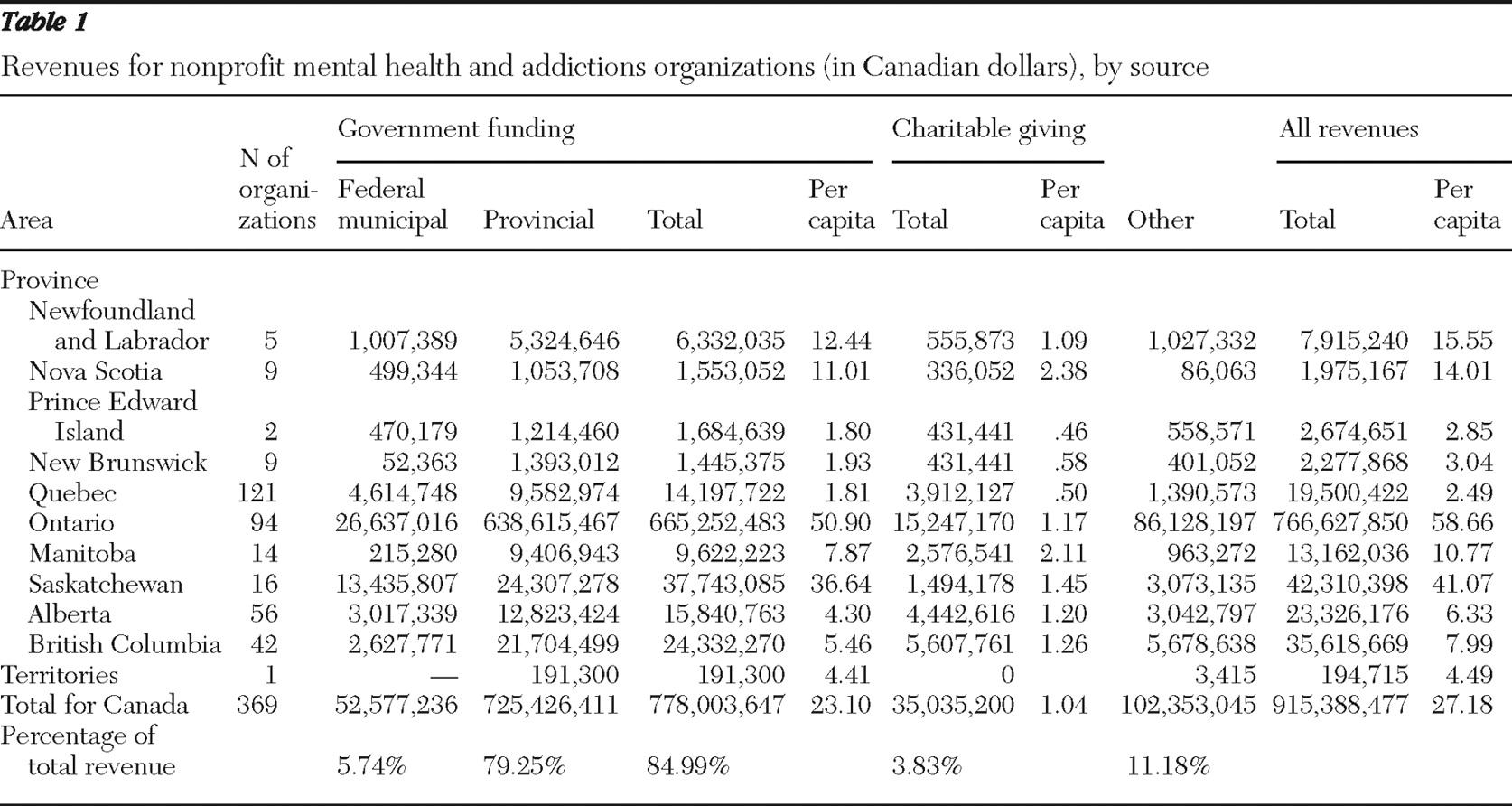In Canada mental health services are primarily operated and funded by the provincial governments, either directly through the ministries of health or through regional health authorities. These services include inpatient and outpatient care, community health services, and physician services. The provincial government also provides mental health services, such as inpatient psychiatric care, employment and vocational services, supportive housing, and other social support. Charitable or nonprofit mental health organizations can augment the government provision of services, with outpatient treatment and residential facilities, as well as employment, education, and advocacy.
According to several prominent Canadian government commissions on health services (
1,
2,
3 ), mental health and addiction services require substantial additional public financial support. The Canadian government spent $6.3 billion in Canadian dollars (CAD) on mental health in 2006, which represents a moderate share of total government health spending—roughly 7% (
4 ), compared with 7.5% in the United States (
5 ) and 12.1% in the United Kingdom (
6 ). Charitable or nonprofit mental health organizations are a form of delivery of publicly funded services. These organizations augment government funding with charitable giving, such as revenue from fundraising and memberships (
7 ). But do these charitable funds compensate for the relatively low level of government spending on mental health? Currently, in Canada, there have been no studies of the contribution of the nonprofit sector in mental health.
Nonprofit charities in Canada are required to submit a federal financial return annually, so it is possible to develop an estimate of the economic role of the nonprofit mental health sector using these data. The study reported here estimated whether this added source of funding compensates for a public-sector shortfall.
Methods
This brief report defines the nonprofit sector as charities in Canada that provide a public good or service, are tax exempt, and are not operated by the government. All nonprofit organizations that operate in Canada must register with Canada's federal tax administrator, the Canada Revenue Agency (CRA), and submit an annual financial report on a T-3010 form. The organization must report identifying information, as well as a financial statement that includes details on revenues and expenditures. Returns are available to the general public (
8 ).
We included charities providing direct mental health and addictions services, including treatment and education. Because organizations often offer an array of services, ranging from education to advocacy to direct outpatient care, we did not specify the types of services each organization provides. However, we excluded organizations that did not provide direct services, such as those performing only research, professional organizations, and charities whose primary purpose is fundraising. We also excluded psychiatric hospitals that are part of the provincial health care system. Organizations that did not exclusively focus on mental health or addictions were also excluded, as were charities focusing on developmental disabilities.
Nonprofit organizations for addictions and mental health are widely scattered, so multiple strategies were used to identify them. We first directly searched the CRA's charities listings online. A list of organizations was obtained from the CRA Web site's charities listings on March 27, 2009. At this time, according to the Web site, the listings were last reviewed in January 2007 (
8 ).
Search terms used to find organizations in Canada were "addictions," "rehab," "drug," "alcohol," "substance," "detox*," "temperance associations," "psych*," "mental health," "depression," "anxiety," "schizophrenia," "bipolar," "eating disorder," "suicide," and "mood." Corresponding French terms were also used. If the results were extensive (more than 50), the search was limited by adding the term "services other than hospitals" or "organizations providing care other than treatment" or "welfare organizations (not else classified)" or "community organizations (not else classified)" or "support of schools and education." Web sites of the organizations were then searched to see whether they fit the inclusion criteria of providing direct treatment of or education on mental illnesses.
Because most Quebec organizations were listed in the French language on the CRA Web site, we supplemented the list with a member list from the Regroupement des Ressources Alternatives en Sante Mentale (Coalition of Alternative Mental Resources of Quebec), a group of mental health nonprofit organizations in Quebec (
9 ). The Mental Health Commission of Canada then sent our completed list to mental health leaders in the health ministries in the ten provinces, who provided the names of missing organizations.
After this enhanced listing of nonprofit mental health and addictions organizations was collected, we searched the CRA site for 2007 financial data on all of the identified organizations. We used the revenue information and divided it into the following groups for analysis. The first group was government revenues: revenues provided by provincial (line item 4550), municipal (4560), and federal (4540) governments. The second group was charitable giving: revenues from gifts (4500 and 4530), transfers from other charities (4510), membership revenue (4620), and fundraising (4630 and 4640). The third group was other sources of revenue: rental income (4610), investment income (4580), proceeds from asset dispositions (4600), and other revenue (4650).
Results
In total we identified 369 reporting organizations in Canada, which received $915.4 million (CAD) in revenues nationally in 2007 (
Table 1 ). Using our search strategy, we found that Quebec and Ontario had the greatest number of nonprofit mental health organizations (121 and 94, respectively). A total of $725.4 million (CAD), 79% of all revenues, were from provincial governments. Revenues from all levels of government came to $778.0 million (CAD), or 85% of total revenue. Seventy percent of the overall total came from the Ontario provincial government alone. Charitable giving represented 4% of all revenues, whereas revenue from other sources (for example, from sales of services) was 11%.
The largest single nonprofit mental health organization in Canada is the Centre for Addiction and Mental Health, with revenues representing 30.9% of the total revenues for nonprofit mental health organizations in Canada ($915.4 million [CAD]). It is the largest mental health treatment center in Canada, providing inpatient and outpatient care, as well as education and advocacy. The nationally representative Canadian Mental Health Association was the second largest, providing a range of direct services, including outpatient care. We counted 93 divisions of the association with available financial information, and the divisions' total revenues represented 22% of national mental health charity revenues ($26.9 million [CAD]).
Total per capita revenues for nonprofits in mental health had a wide range, from $2.49 (CAD) in Quebec to $59 (CAD) per capita in Ontario. Revenues from the government in Ontario and Saskatchewan were all over $20 (CAD) per capita. Charitable giving was under $3 (CAD) per capita nationwide.
Discussion
We estimated the overall economic contribution of charitable mental health organizations in Canada, in terms of total revenues, to be $915.4 million (CAD) in 2007. Most of these were provincial government payments (79%), and 4% of revenues were from charitable giving.
Per capita revenues ranged from less than $3 (CAD) in Prince Edward Island and Quebec to $58.66 (CAD) in Ontario. This could indicate a variation between provinces in their reliance on nonprofit mental health organizations for service delivery. One U.S. study showed that the organization and financing of mental health systems also vary between states, with some state governments providing more direct mental health care than others (
10 ). Provinces that may rely considerably on nonprofit organizations to deliver mental health services have correspondingly high per capita revenues.
We found that Canadian giving levels are not high enough to compensate for relatively low levels of government mental health spending. Canadian government spending on mental health in relation to total health spending is 7%, which is lower than that of the United States (7.5%) and the United Kingdom (12.1%) (
6 ). However, our results show that the ratio of charitable giving to mental health nonprofit organizations ($35 million [CAD]) to government mental health spending ($6.3 billion [CAD] [4]) was about .55%. This can be compared with ratios of 1.13% in the United States (
5,
11,
12 ) and .6% in the United Kingdom (
6 ).
There are some limitations to the study. There is a possibility, for example, that data from smaller charities were not captured in our search strategy. To some degree, this was ameliorated by information received from mental health authorities in each province. Also, there was a high concentration of dollars given to larger charities in Canada, so it is unlikely that we have missed a significant amount.
Conclusions
The nonprofit mental health sector in Canada varies in size and role across the country. Although nonprofit mental health organizations play a substantial role in service delivery, charitable giving as a percentage of government expenditures is relatively small. Although the nonprofit sector is important, its role of infusing new funds into the mental health system is not sufficient to offset the low level of government expenditures on mental health.
Acknowledgments and disclosures
This project was supported by the Mental Health Commission of Canada.
The authors report no competing interests.


